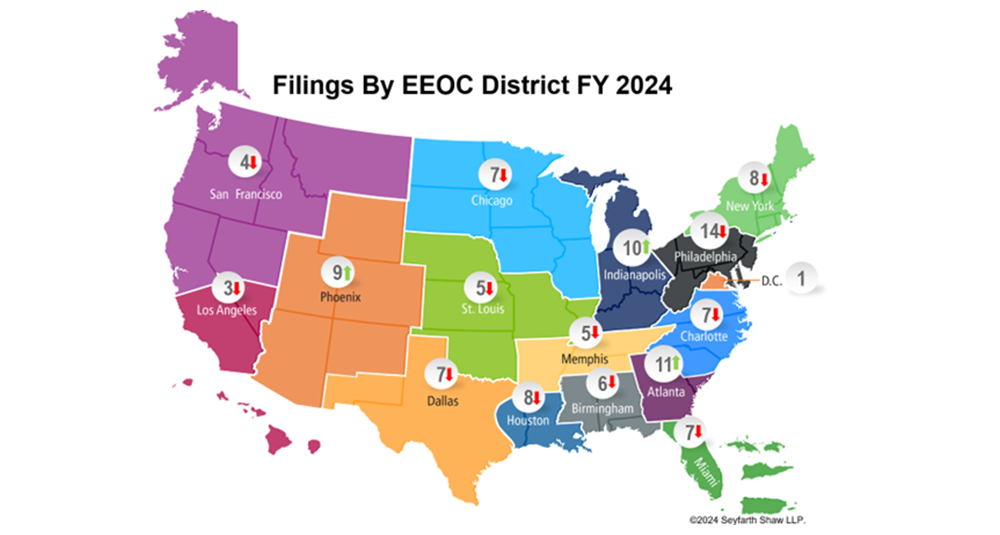
SEYFARTH SHAW
Given how much is at stake in the 2024 presidential election, the future direction of the Equal Employment Opportunity Commission is likely not near the top of anyone’s list outside of the employment bar.
Yet that subject was very much top of mind for attorneys upon the recent release of an annual survey of EEOC activity.
Conducted by law firm Seyfarth Shaw, the survey shows a surprising 35-percent drop in the number of merit lawsuits filed by the commission in FY24, a counterintuitive result given the previous fiscal year’s spike in filings and newly minted Democratic majority on the EEOC, the study’s authors note.
They conclude that resources may have been the main driver for the EEOC filing only 96 merit lawsuits in FY24, as compared to 144 the year before. The commission asked Congress for $26 million more to do its work in FY24 but instead was level funded and then had to allocate some of that funding to 5.2 percent raises for its employees.
The agency that enforces federal anti-discrimination laws even mulled a one-day furlough in August to address its budget crunch but was able to get by without it. But it still had to deal with the previous year’s filing surge.
“Ultimately, the EEOC approached FY 2024 with more cases but the same resources,” the Seyfarth study says.
As they were nationwide, filings in the northeast region were down in FY24, though the offices most likely to initiate cases involving Massachusetts and Rhode Island companies were among the busiest, with Philadelphia filing 14 cases and New York eight.
As is typical, the EEOC filed most of its lawsuits under Title VII and the Americans with Disabilities Act, with hearing-related disabilities a particular focus under the ADA. The EEOC had published guidance regarding hearing disabilities in the workplace in January 2023 and has since filed 16 ADA cases on behalf of affected employees, nine in FY23 and seven in FY24.
The EEOC also filed its first three lawsuits under the Pregnant Workers Fairness Act after issuing its final regulations concerning its enforcement on April 15.
In FY24, the EEOC also took a newfound interest in the failure to file annual workforce data reports, filing a “whopping” 16 lawsuits alleging Title VII violations against employers who failed to meet their obligations. It then called attention to the bulk of those filings in a May press release.
However, despite a massive spike in EEOC charges between FY21 and FY22 alleging religious discrimination, the EEOC showed minimal interest in pursuing religion-based claims in FY24. Many of those charges continued to involve COVID-19 vaccine mandates and a denial of religious accommodations.
“Given that it has been several years since this batch of EEOC charge filings, it seems that the apparent wave of EEOC religion-based, COVID-19 litigation will be left largely to the private plaintiffs’ bar,” the study concludes.
 New England Biz Law Update
New England Biz Law Update
